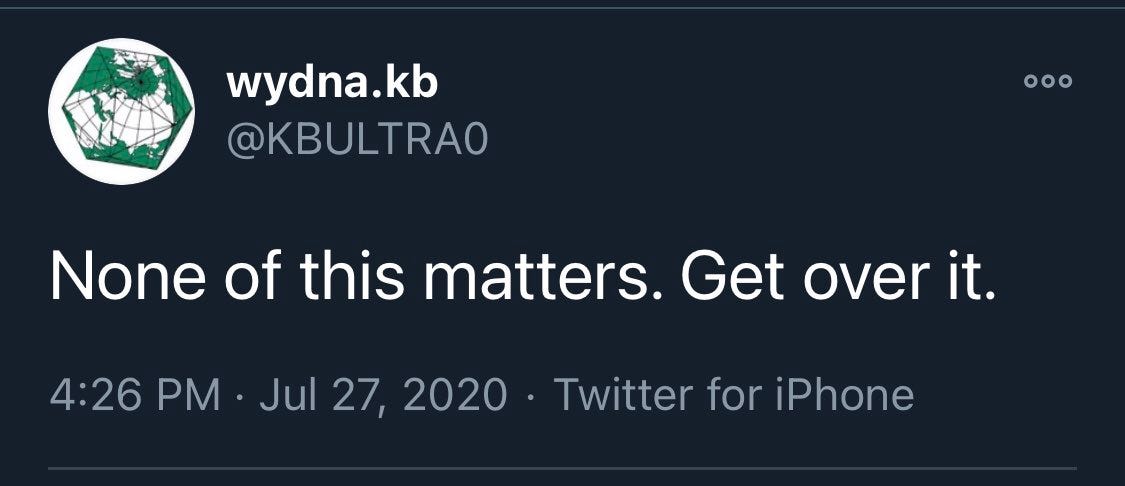The appearance of more than usual happening, but according to which register, whose decisions? Micro signs, among others: for example, a quibble breaks out about the performative and constative in social media grammars between Daniel Keller and RIP-Kantbot, see thread here.
Do things matter, and what does it mean when someone tells you they don’t, how could it even be possible they don’t? Yarvin’s position—recall—is that we are all nihilists (i.e. it really doesn’t matter: Yarvin and Kantbot are in agreement on this), but as discussed in a previous note, Yarvin’s formal nihilism (pure polity) is virtually frozen, as if in a prefigural kill-chain, by an unacknowledged vacillation between realism and dreampolitik, that is, between it mattering and not mattering (ethics and description, knowledge and persuasion). And the same can be said for Kantbot’s gaming of Twitter Inc., which I think the reply guys, including Keller, are right to announce as now closing out.


What perhaps matters here, ‘more than anything’ (a dubious trope, to start with), is why it really does continue to matter, and why Yarvin-Kantbot (for example) would spend so much time convincing the imaginary reader (who does not exist—only the scanner lurks), that it really does fail to matter. Socialism does not exist, and neither does capitalism. Trump couldn’t do it, Kantbot couldn’t do it, AIDS-3D couldn’t do it, and so on, etc, and so forth . . . and the projected winner here is the one who announces first that they cared the least, which Yarvin-Kantbot has to do again and again (a repetition compulsion opens out, of course, in the year known as ‘2017.4’ i.e. 2021, see reading notes #8), and here’s a new Substack post on what all this means.
In other words, if we were to apply again this suspicious-looking turn of phrase, what really matters, then what really matters is working out how these supposedly very now announcements of things not mattering (Kantbot and Yarvin’s shared thought of formal nihilism) are subject to the need for repetition. That is, who are they trying to convince?
Or again, would there be any point in saying that Kantbot and Yarvin are in turn cucked by the need of a Super-Reader, which is to say a future AGI, and all such trendy know-how turns out to have been of no benefit to anyone at all? None of this matters, none of this epistemologically faulty formal nihilism and polity, that is, but then, beyond the Kantian bot and the NRx formalist, we would have to—why this ‘have to’ though?—show how further statements, perhaps, function.
Keller makes another nice historical point—worth mentioning before finishing this note—which is that for Kantbot nothing matters only in the contemporary moment. Trump is a loser, the Trumpians are all cucks, Greenwald and co. are all fools for believing anything would change, why would anyone continue to track contemporary politics, and so on, and yet what does matter to Kantbot is the Tank Wars, Nixon, Iran-Contra, and so on, etc.
Kantbot, like everyone, in their own way, is perhaps shielding from the contemporary moment. Together with Logo, isolation from the complexity of the present is in order. Why try to analyse the ongoing dialectic or bother taking a side in the fiendishly treacherous when one can binge-record a 17 hour podcast on past events? The serial recording of a podcast is no less addictively aberrant and tropologically rebarbative than listening to it or watching the whole of The Queen’s Gambit in a single day of lockdown. It could just be, for example, that Kantbot simply hasn’t read up on the present with anything like the assiduousness with which he reads the past. Therefore, none of the present matters, it really doesn’t—but in that case, ‘the present’ becomes a long now, subtracting and subsuming 1973, and so on, etcetera, and so forth.




